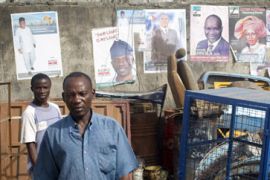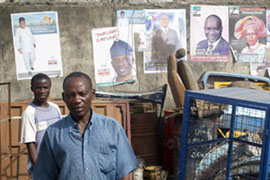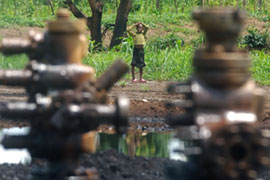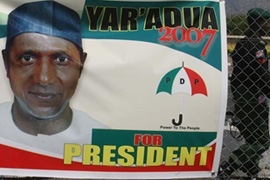Q&A: Nigeria’s elections
Nigerians will elect state officials on April 14 and a new president on April 21.

 |
| About 60 million voters have a choice of 24 presidential candidates [AFP] |
Who is voting and for what?
About 60 million registered voters will go to the polls on April 14 to elect state governors and legislators before heading back on April 21 to elect a president and a national assembly.
The new president will be elected for a renewable four-year term.
Nigeria’s bicameral national assembly consists of the 109-seat senate and 346-seat House of Representatives.
Why is the election important?
The forthcoming polls represent another test of Nigeria’s relatively young democracy.
| Nigeria factbox |
|
Population: 126.9 million people from more than 200 ethnic groups |
The election of Olusegun Obsanjo as president in 1999 ended nearly 30 years of almost continual dictatorship in Nigeria and the 2007 presidential vote should ensure the first transition of power from one elected leader to another since independence in 1960.
Many did not expect an elected government to last so long and with persistent accusations of vote-rigging and corruption rampant, the risk that the military may one day seize power is never far away.
Who controls Africa’s second-largest economy is also of interest to international observers. Nigeria is the world’s eighth-biggest oil exporter, with proven reserves of more than 36 million barrels and petroleum exports worth nearly $47m a year.
Will the election be fair?
Nigeria regularly languishes near the bottom of Transparency International’s corruption index and in 2003 was perceived as the second-most corrupt country in the world. Consequently there are always concerns over the legitimacy of elections in the country.
 |
| Nigeria is the world’s eighth-biggest oil exporter [AFP] |
Obsanjo’s seeming reluctance to relinquish power (he is constitutionally barred from standing for re-election) saw him attempt to alter the constitution last year so he could serve another term.
The opposition accuse the ruling People’s Democratic Party (PDP) of political manoeuvring and say the exclusion of Atiku Abubakar, the country’s vice-president, from the ballot due to corruption charges, is politically motivated.
Rights groups such as the International Crisis Group, have expressed concern over the preparation for the presidential vote while hundreds of election monitors have yet to be accredited.
What challenges will the new president face?
As well as tackling Nigeria’s endemic corruption, the new leader will face tough challenges in keeping all of Nigeria’s 127 million people and more than 200 ethnic groups happy.
A main point of concern is the troubled Niger delta region, the heart of the country’s oil industry.
In the past year, attacks on oil facilities by armed groups such as the Movement for the Emancipation of the Niger Delta have forced Nigeria to shut down a fifth of its production. Kidnappings of foreign workers continue unabated; 100 such incidents have taken place in the last 12 months.
Who are the candidates?
After Obsanjo failed to alter the constitution so he could stand again, the PDP has put forward Umaru Yar’Adua, a state governor from the country’s mainly Muslim north, as its candidate.
 |
| Umaru Yar’Adua is the presidential candidate for the ruling People’s Democratic Party [AP] |
The main opposition candidate, who led polls in January, is Muhammadu Buhari, a former army ruler from the All Nigeria People’s Party (ANPP).
Concerned that the opposition vote could be split, he has called for a “granite alliance” against the PDP, which he accuses of vote-rigging and manipulation.
The ANPP had previously signed an informal alliance deal with the Action Congress (AC), the second-largest opposition party.
The AC vote may swing behind Buhari if its chosen candidate, Atiku Abubakar, cannot overturn the ruling to disqualify him from standing.
Abubakar has continued to campaign in the hope that the supreme court will overturn his disqualification before the presidential vote on April 21.
There are a total of 24 candidates running for president, but Buhari is by far the most credible challenger to the PDP’s stranglehold on power in a democratic Nigeria.